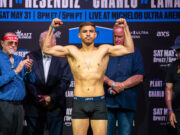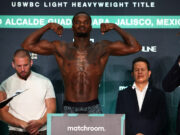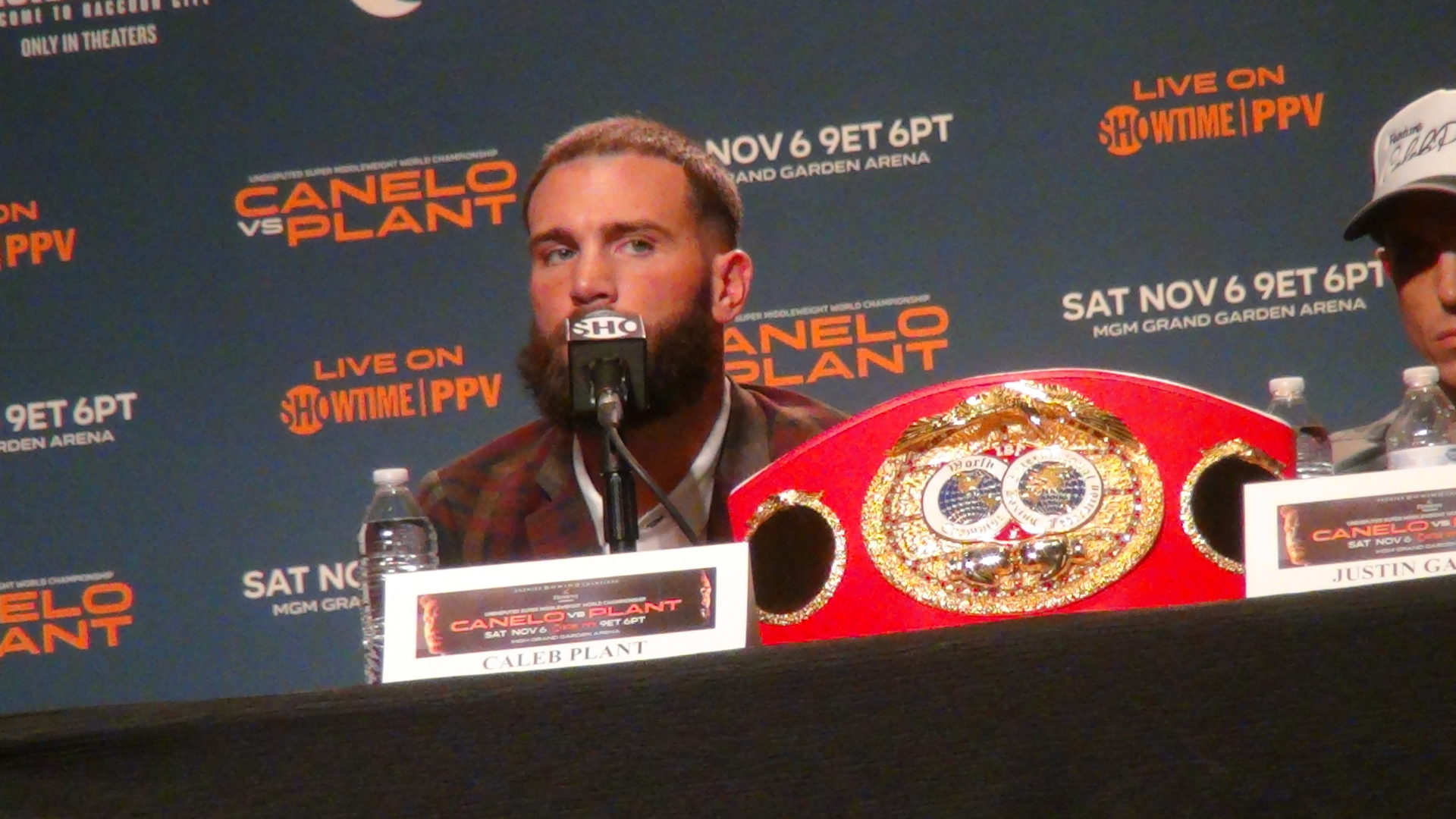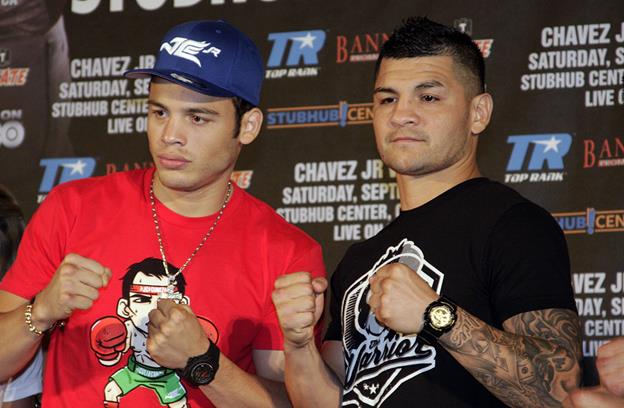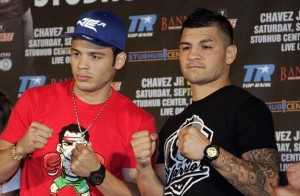
SAN ANTONIO – Thursday, Mexican “Son of the Legend” Julio Cesar Chavez Jr. strode across the Alamodome stage to a podium that would conceal, for once, a fairly lean version of Junior, a version of him that surprisingly looked within 20 pounds of his next match’s contracted fighting weight, six weeks out, a match that will be a rematch with Austin’s Bryan Vera, a man who likely deserved a better result than what he received in September and will more than likely deserve better than the savage beating he collects March 1.
“And thank you, Texas,” Chavez said in accented English, to close. “Because this my home too.”
Chavez appeared chastened. Years back, Argentine Sergio Martinez, incensed his WBC belt was unfastened from his waste and bestowed upon Chavez by the late Jose Sulaiman – a man ever more beloved in Mexico, for codifying the country’s importance in prizefighting, than in the United States – arrived at a postfight press conference in Houston after Chavez beat up and beat down Peter Manfredo who, personably enough, indulged bystanders’ curious requests to hear him say “fugettaboutit” after he was stopped and announced a stop to his career (a retirement that lasted, stereotypically enough, nary a twelvemonth), to challenge Chavez in his finest hour, and Martinez was uncharacteristically dismissive too. He asked rhetorically if he wouldn’t knock Chavez out easily. At the time it seemed quite probable.
Fewer than 10 months later, Chavez nearly ended Martinez’s reign as a world champion, coming preposterously close to becoming the linear middleweight champion, affixing himself to a bloodline of Marvelous Marvin Hagler and Carlos Monzon and Sugar Ray Robinson and Harry Greb, in a fight that changed both men, shortening Martinez’s career and the lucid years of Chavez’s life. Lost in the justifiable contempt aficionados reserve for Chavez is any consideration for the consequences of the sustained whupping he took from Martinez’s fists, and the incredible number of punches he took square and unmolested to his cranium – each punch nearly the force of what single blow put Paul Williams prostrate on a blue mat in Atlantic City.
Chavez wishes to be taken seriously, by himself and others, one hears from men who should know, and certainly should know better if it is not so – men who’ve seen, fallen victim to, or perpetrated, every hustle yet known in our beloved sport. Chavez does take boxing seriously, they say. If this is so, and again some suspension of disbelief is required, he may now be suffering from a combination of genetics and a damaged brain.
Boxing has rarely come upon a more naturally unsympathetic figure than Chavez; Adrien Broner and Floyd Mayweather, of course, have as large a percentage of attendees at their matches cheering their demise, yes, but those men worked hard to cultivate odious public personalities, and those men, too, remain for the most part popular within their own ethnicity. Chavez, conversely, now holds a unique place in boxing’s landscape as a man who, through no overt effort of his own – through no detectable effort of any kind, one might say – has transformed an entire ethnic enclave, Mexican-American, from a default sort of projected affection, the son of my hero is my friend, to another thing entirely. Chavez is aware of this even without his father reminds him, though Chavez Sr. appears the kind of dad who might be willing to grunt just such a suggestion to a filial epigone like Junior, privately.
Senior’s popularity has a variety of sources, but an occasionally overlooked one is historical: Mexico collapsed in an epic sort of way in 1994 – and such a collapse injured cruelly a proud and surprisingly innocent country, one whose residents, when called upon by their government to help La Patria recover its economic footing, sent gifts and sundries varied as live chickens to Mexico City – and for the next number of years, Chavez Sr. was, as one Mexican journalist put it at what became Chavez Sr.’s final fight, “the only thing that went right for us.” Junior was a part of that Mexico more than Americans, and most Mexicans, care to realize.
Watch the ringwalk that preceded Chavez Sr.’s worst professional moment to that point, his official draw in 1993 with Pernell “Sweat Pea” Whitaker, a singular boxer whom shot commentator Ferdie Pacheco continued to call “Peewee” through the pay-per-view broadcast. Who sits atop one of the entourage’s shoulders, looking down on his father while the legend sings along to the Mexican national anthem before a record-setting crowd in this city’s then-four-month-old Alamodome? It is Junior’s unmistakable chubby-cheeked visage one sees, a face portending a lifetime of weight struggles regardless of profession, spreading tentatively beneath a red headband like his dad’s.
“Son of the Legend” has been part of boxing his entire life, the number of those memories a fair auditor would call euphoric barely outnumbering those classifiable as euphoria’s opposite, and he understands, as Freddie Roach recognized in the first week as his trainer, “the geometry of the ring.” He probably believes he beat Bryan Vera in September, potshotting him the way Sergio Martinez amassed a lopsided lead on Chavez himself the year before, and knowing, as television didn’t show, Chavez’s punches were many times harder and flusher than Vera’s. He also knows how many people hold him in contempt and knows he now deserves it in a way he probably did not before. He is much better than Bryan Vera, and if he is motivated and conditioned – and again, he appeared reasonably trim Thursday – he may put a tragic type of beating on Vera, who for all his activity, is not nearly strong or elusive enough to dissuade Chavez in an emergency.
For once Texas should not worry about judges but ringside medical officials willing to intervene if Vera’s corner comports itself too courageously on March 1.
Bart Barry can be reached via bart.barrys.email (at) gmail.com



